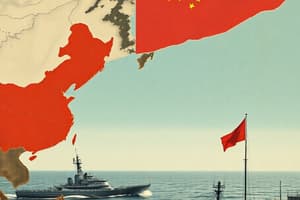Podcast
Questions and Answers
Which countries are primarily involved in the South China Sea dispute?
Which countries are primarily involved in the South China Sea dispute?
- China, Japan, India, Russia
- Indonesia, Australia, India, Japan
- Thailand, Myanmar, Laos, Cambodia
- China, Philippines, Vietnam, Malaysia (correct)
What is the 'Nine-Dash Line'?
What is the 'Nine-Dash Line'?
- A maritime boundary claimed by China in the South China Sea (correct)
- A fishing agreement between ASEAN countries
- A trade route connecting nine Asian countries
- A naval strategy used by the U.S. in the Pacific
Which body of water is the South China Sea dispute centered around?
Which body of water is the South China Sea dispute centered around?
- Pacific Ocean
- Indian Ocean
- South China Sea (correct)
- East China Sea
What natural resources are abundant in the South China Sea?
What natural resources are abundant in the South China Sea?
What is the significance of the Spratly Islands in the South China Sea dispute?
What is the significance of the Spratly Islands in the South China Sea dispute?
How does the United Nations Convention on the Law of the Sea (UNCLOS) relate to the South China Sea dispute?
How does the United Nations Convention on the Law of the Sea (UNCLOS) relate to the South China Sea dispute?
How has China’s construction of artificial islands affected the South China Sea dispute?
How has China’s construction of artificial islands affected the South China Sea dispute?
How does the South China Sea dispute impact global trade routes?
How does the South China Sea dispute impact global trade routes?
How have historical claims contributed to the South China Sea dispute?
How have historical claims contributed to the South China Sea dispute?
Describe the role of the Permanent Court of Arbitration in The Hague in the South China Sea dispute.
Describe the role of the Permanent Court of Arbitration in The Hague in the South China Sea dispute.
What is the impact of military presence by various countries in the South China Sea?
What is the impact of military presence by various countries in the South China Sea?
How do fishing rights factor into the South China Sea dispute?
How do fishing rights factor into the South China Sea dispute?
Explain the geopolitical implications of the South China Sea dispute on China’s relations with neighboring countries.
Explain the geopolitical implications of the South China Sea dispute on China’s relations with neighboring countries.
How has the dispute in the South China Sea affected the security of smaller Southeast Asian nations?
How has the dispute in the South China Sea affected the security of smaller Southeast Asian nations?
What measures have been proposed to resolve the South China Sea dispute peacefully?
What measures have been proposed to resolve the South China Sea dispute peacefully?
How does the concept of national sovereignty play a role in the South China Sea dispute?
How does the concept of national sovereignty play a role in the South China Sea dispute?
Flashcards are hidden until you start studying
Study Notes
South China Sea Dispute Overview
- Main countries involved include China, Philippines, Vietnam, and Malaysia.
- The conflict revolves around territorial claims, fishing rights, and resource exploitation.
Nine-Dash Line
- Represents China's claimed maritime boundary in the South China Sea, influencing regional tensions.
Body of Water
- Dispute centers around the South China Sea, a crucial body of water for trade and resources.
Natural Resources
- The South China Sea is rich in oil and natural gas reserves, heightening competition among nations.
Significance of the Spratly Islands
- Holds strategic military value and offers access to resource-rich waters, central to the dispute.
UNCLOS and Its Relevance
- The United Nations Convention on the Law of the Sea establishes guidelines for maritime boundaries and territorial claims.
ASEAN's Role
- The Association of Southeast Asian Nations acts as mediators, promoting peace and stability without enforcing military action.
Impact of China's Artificial Islands
- China’s construction of artificial islands has increased its territorial claims and military presence, escalating tensions.
Global Trade Routes
- The South China Sea is vital for securing major shipping lanes, and disputes threaten international trade security.
U.S. Strategic Interests
- The United States aims to ensure freedom of navigation and regional stability in the context of ongoing disputes.
Historical Claims
- Historical territorial claims compound current tensions and disputes, complicating negotiations.
Permanent Court of Arbitration
- The court ruled against China's territorial claims under UNCLOS, emphasizing the legal complexities of the dispute.
Military Presence
- The military actions of various nations increase regional tensions and the risk of conflict.
Fishing Rights
- Fishing rights are a major aspect of resource conflicts among competing nations in the South China Sea.
Geopolitical Implications
- The dispute strains China's relations with neighboring countries, increasing regional tension and competition.
Security of Southeast Asian Nations
- Smaller nations are made more vulnerable to coercion and pressure due to the heightened military presence in the region.
Proposed Solutions
- Peaceful resolution measures include multilateral negotiations and adherence to international law, rather than military buildup or sanctions.
National Sovereignty
- Sovereignty plays a crucial role as countries assert territorial claims based on their perceived rights.
Environmental Concerns
- Construction activities lead to the destruction of coral reefs and marine habitats, raising environmental alarms.
Role of External Powers
- External powers’ involvement significantly influences the dynamics of the South China Sea dispute, affecting regional relationships.
Studying That Suits You
Use AI to generate personalized quizzes and flashcards to suit your learning preferences.




